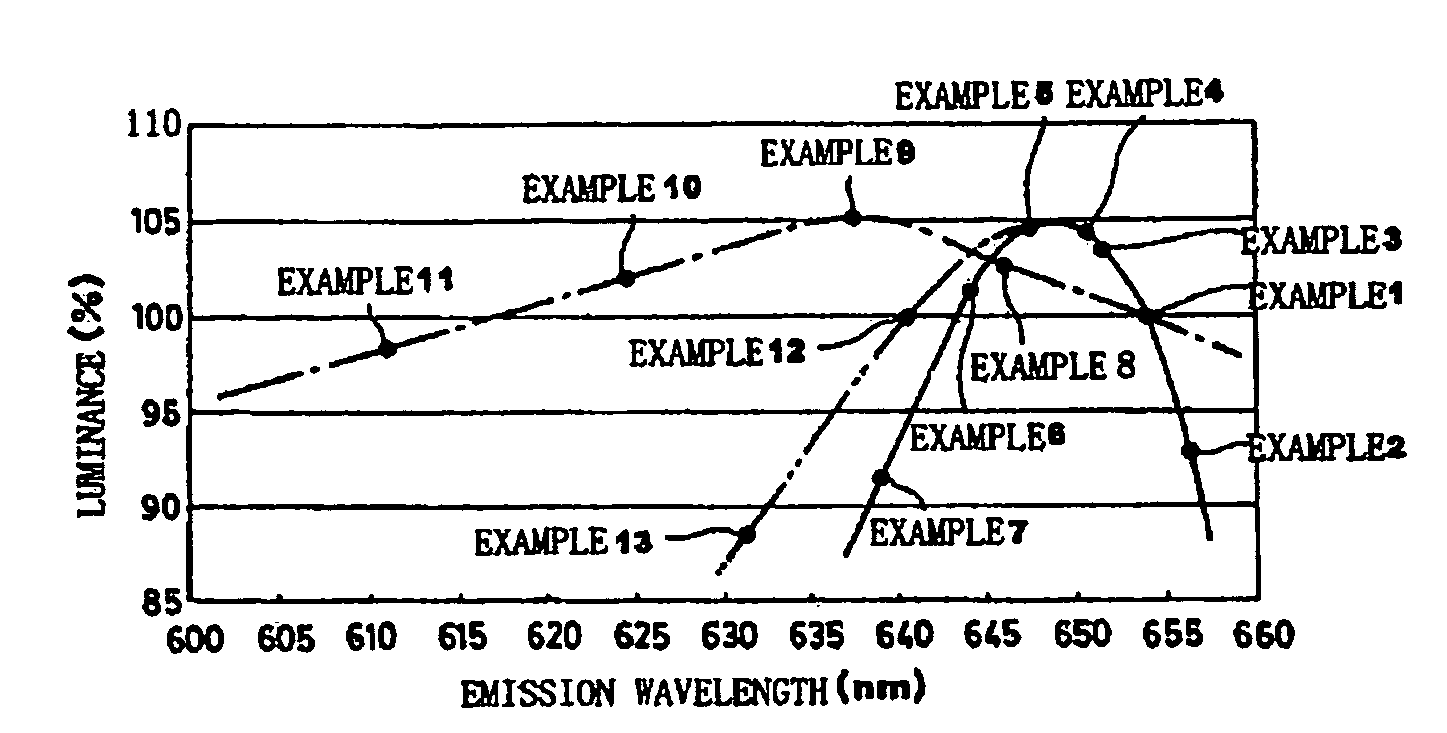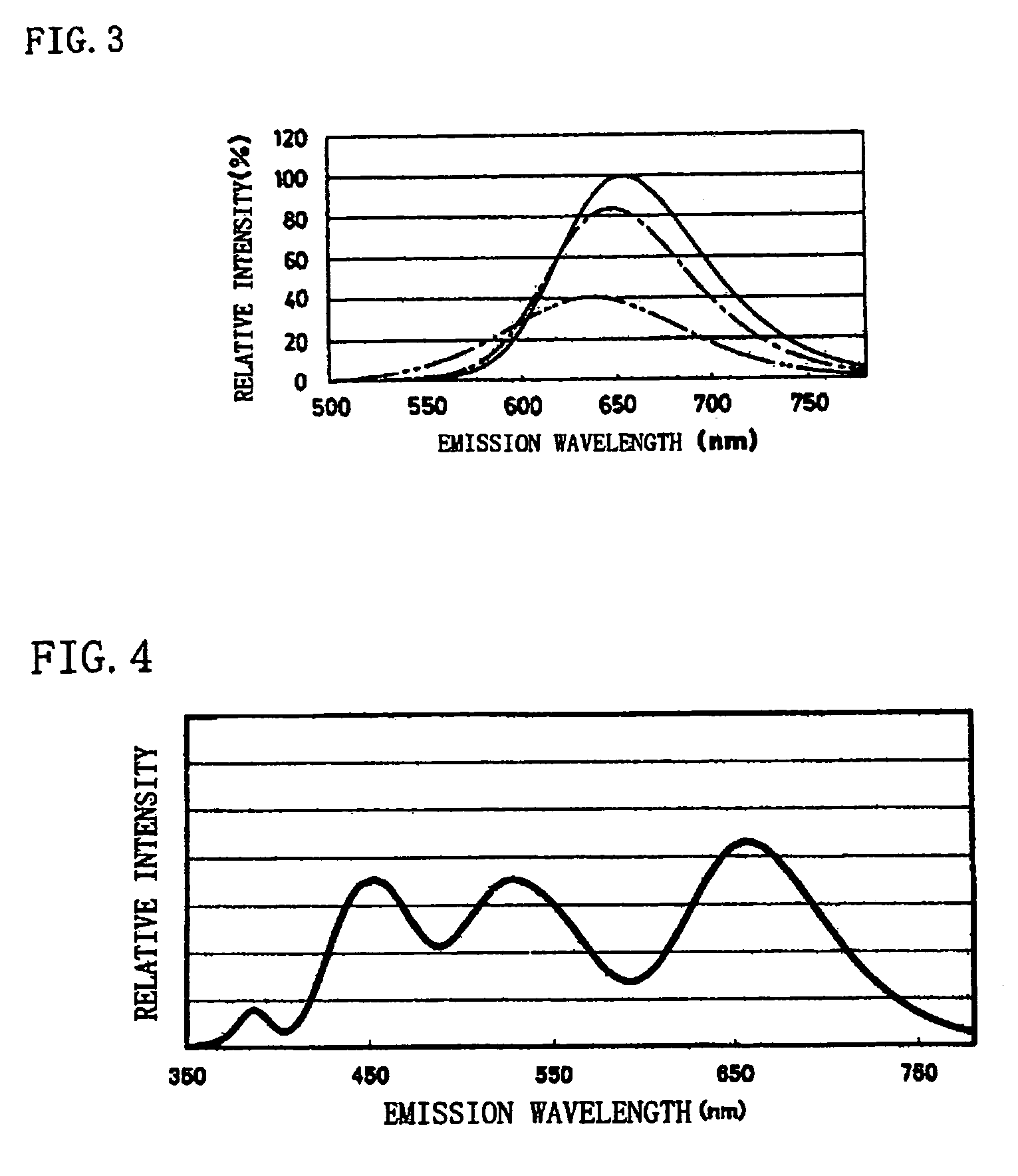Phosphor and production method of the same, method of shifting emission wavelength of phosphor, and light source and LED
a production method and emission wavelength technology, applied in the direction of discharge tube luminescent screen, discharge tube/lamp details, luminescent compositions, etc., can solve the problems of short life span, inability to obtain white color with high luminance, and light emission of while slightly tinged with red as an electric bulb, etc., to achieve excellent luminance properties, high emission efficiency, and high visual sensitivity
- Summary
- Abstract
- Description
- Claims
- Application Information
AI Technical Summary
Benefits of technology
Problems solved by technology
Method used
Image
Examples
example 1
[0093]Commercially available Ca3N2(2N), AlN(3N), Si3N4(3N), Eu2O3(3N) were prepared, and after each raw material was weighed so that 0.985 / 3 mol of Ca3N2, 1 mol of AlN, 1 / 3 mol of Si3N4, and 0.015 / 2 mol of Eu2O3 are obtained, the raw materials were blended by using the mortar inside the globe box under the nitrogen atmosphere. After the blended raw materials were put into the crucible and were held under the nitrogen atmosphere at 1500° C. for three hours and fired, the raw materials were cooled from 1500° C. to 200° C. in one hour, and the phosphor including the production phase expressed by the composition of CaAlSiN3:Eu was obtained. The particle size of the obtained phosphor specimen was 3 to 4 μm. (Hereinafter, in the examples 2 to 13, the particle sizes of the obtained phosphor specimens were 3 to 4 μm.)
[0094]The excitation light source of the wavelength of 460 nm was emitted to the obtained phosphor and the light emission properties were measured. In the items of the measured...
example 2
[0104]Except that the mixture ratio of the respective raw materials was set at 0.9825 / 3 mol of Ca3N2, mol of AlN, 1 / 3 mol of Si3N4 and 0.0175 / 2 mol of EU2O3, the phosphor specimen according to the example 2 was produced similarly to the example 1, and the light emission properties were measured. The raw material composition formula, the concentration analysis result of each element, and the measurement result of the light emission properties of the phosphor specimen are shown in Table 1.
example 3
[0105]Except that the mixture ratio of the respective raw materials was set at 0.9875 / 3 mol of Ca3N2, 1 mol of AlN, 1 / 3 mol of Si3N4 and 0.0125 / 2 mol of Eu2O3, the phosphor specimen according to the example 3 was produced similarly to the example 1, and the light emission properties were measured. The raw material composition formula, the concentration analysis result of each element, and the measurement result of the light emission properties of the phosphor specimen are shown in Table 1.
PUM
| Property | Measurement | Unit |
|---|---|---|
| particle size | aaaaa | aaaaa |
| wavelength | aaaaa | aaaaa |
| wavelength | aaaaa | aaaaa |
Abstract
Description
Claims
Application Information
 Login to View More
Login to View More - R&D
- Intellectual Property
- Life Sciences
- Materials
- Tech Scout
- Unparalleled Data Quality
- Higher Quality Content
- 60% Fewer Hallucinations
Browse by: Latest US Patents, China's latest patents, Technical Efficacy Thesaurus, Application Domain, Technology Topic, Popular Technical Reports.
© 2025 PatSnap. All rights reserved.Legal|Privacy policy|Modern Slavery Act Transparency Statement|Sitemap|About US| Contact US: help@patsnap.com



